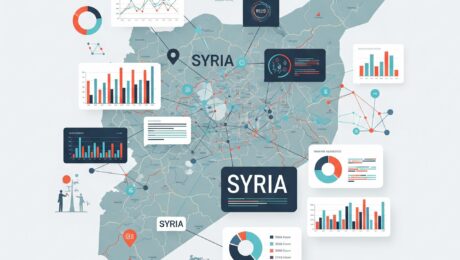The Social Structure in Syria
Syria represents a rich and complex fabric of cultures, religions, sects, and ethnic groups that together form a unique social composition. Understanding this structure is not merely an academic exercise—it is a strategic necessity for any organization or business aiming to succeed and make an impact within the country. At Insight Syria, we believe that delving into these social dynamics is the key to effectively understanding the behavior of Syrian consumers and citizens.
Dimensions of the Syrian Social Structure and Their Impact:
Religious and Sectarian Diversity:
Syria is home to various religious and sectarian groups, including Muslims (Sunnis, Alawites, Druze, Shia), Christians (Orthodox, Catholics, Protestants), and others.
- Impact on Consumer Behavior: Religious affiliations can influence product preferences (e.g., halal foods), consumption patterns during religious holidays and events, and even brand loyalty to those aligned with specific values.
- Impact on Citizen Behavior: Sectarian affiliations play a role in shaping public opinion on political and social issues, trust in institutions, and community participation.
Ethnic and Cultural Affiliations:
In addition to the Arab majority, Syria includes ethnic minorities such as Kurds, Turkmen, Assyrians, and Armenians—each with its own language, customs, and traditions.
- Impact on Consumer Behavior: Product and service preferences can vary significantly across ethnic groups. For example, there may be demand for specific traditional foods or clothing.
- Impact on Citizen Behavior: Ethnic identity can influence participation in public life, development priorities, and even response to humanitarian initiatives.
Tribal and Family Dynamics:
In many Syrian regions, tribal and family ties remain very strong, playing a central role in daily life—from social relationships to economic decisions.
- Impact on Consumer Behavior: Family and tribal networks can influence purchasing decisions through word-of-mouth recommendations, preference for family-linked businesses, or even collective consumption habits.
- Impact on Citizen Behavior: These dynamics can shape political loyalties, trust in authorities, and play a role in conflict resolution and local resource distribution.
Urban vs. Rural Differences:
Lifestyles, needs, and values differ significantly between urban centers and rural areas.
- Impact on Consumer Behavior: Urban consumers tend to be more open to modern products and digital services, while rural residents may favor local and traditional goods.
- Impact on Citizen Behavior: Citizens’ priorities can vary between urban areas (focused on employment and infrastructure) and rural regions (focused on agriculture and water resources).
Impact of Conflict and Displacement:
The recent conflict has brought significant demographic and social changes, including internal and external displacement, and shifts in the population makeup of cities and regions.
- Impact on Consumer Behavior: Changes in income, market access, and shifting priorities have led to major changes in consumption patterns.
- Impact on Citizen Behavior: Displacement has affected community ties, basic needs (like shelter and education), and perceptions of safety and stability.
How Does Insight Syria Help in Understanding This Structure?
At Insight Syria, we recognize that a surface-level understanding of social structure is insufficient. Therefore, we rely on:
- A Broad Field Team: With 500 field researchers from all regions and affiliations across Syria, we ensure access to diverse population segments and collect representative, accurate data.
- Mixed Research Methodologies: We combine quantitative research (for measurement and identification) with qualitative research (for deep understanding of motivations and context), including in-depth interviews and focus groups that reveal subtle nuances.
- Specialized Contextual Analysis: Our expert analysts interpret data within Syria’s unique cultural, social, and political context, turning numbers into actionable insights.
- Tailored Studies: We offer specialized studies on cultural values, tribal dynamics, gender roles, and the impact of displacement, providing our clients with comprehensive understanding.
By grasping these complex dimensions of Syria’s social structure, Insight Syria empowers businesses and organizations to design more effective strategies, develop products and services that meet real needs, and build strong relationships with the communities they serve—ultimately contributing to shaping a better future for Syria.
Challenges Facing International Companies in the Syrian Market
For international companies seeking to enter or expand their operations in Syria, the opportunities may appear promising, but the challenges are equally complex. Failure to grasp the nuances of this unique market can lead to unsuccessful investments and ineffective marketing efforts. This is where the critical importance of having a reliable local partner — such as Insight Syria — becomes evident, serving as an essential bridge between international ambition and Syrian reality.
Key Challenges in the Syrian Market:
Cultural and Social Complexity:
As previously noted, Syria is a rich tapestry of cultures, customs, traditions, and even regional dialects. What works in other markets may not resonate here.
Shifting Regulatory and Legal Environment:
Trade and investment laws and regulations in Syria can be complex and subject to change, requiring deep local insight.
Limited Access to Reliable Data:
Official data may be outdated or scarce. Accessing accurate consumer insights requires extensive field expertise.
Infrastructure and Logistics Challenges:
International companies may struggle to understand supply chains, distribution networks, and infrastructure gaps in various regions.
Political and Security Sensitivities:
Operating in Syria demands constant awareness of political and security dynamics and the ability to navigate potentially unstable environments.
Changing Consumer Behavior:
Years of conflict and economic hardship have dramatically altered Syrian consumer behavior, making it essential to gain current, nuanced insight into evolving needs and priorities.
How a Local Partner Solves These Challenges
A local partner offers more than just services — they provide true “insight” and build real “bridges”:
Deep Cultural Expertise:
A local partner has an innate understanding of Syrian culture, values, traditions, and communication subtleties. This ensures marketing messages are well-received, products align with cultural needs, and business interactions are respectful and effective.
Access to Local Networks:
Local partners maintain strong relationships with government bodies, suppliers, distributors, and communities. This facilitates licensing, partnership building, and navigating bureaucratic obstacles.
Capability to Collect Reliable Field Data:
A local partner can access areas that may be challenging for international firms and collect trustworthy data through trained field teams who understand the context and can build trust with respondents.
Understanding of Legal and Regulatory Landscape:
A local partner can guide companies through local laws, licensing requirements, and compliance, reducing legal and operational risks.
Contextualized Analysis:
Local partners don’t just collect data — they interpret it within the unique Syrian context, transforming numbers into actionable insights that reflect the economic, social, and political environment.
Building Trust and Credibility:
Working with a local partner boosts an international company’s credibility in the Syrian market, signaling that it understands and respects the local context.
Insight Syria: Your Trusted Local Partner
At Insight Syria, we embody all these advantages. With our field team of over 500 researchers spread across Syria, our deep expertise in market research and data analytics, and our nuanced understanding of cultural and social dynamics, we offer international companies:
- Accurate Market Insights: Grounded in reliable data and contextual understanding.
- Strategic Consulting: To help you successfully navigate the Syrian market.
- Risk Mitigation: Through a thorough understanding of challenges and opportunities.
- Operational Support: Enabled by our extensive local network.
Partnering with a local firm like Insight Syria is not a cost — it is a strategic investment. It opens the door to sustainable growth opportunities in the Syrian market and ensures your decisions are grounded in a real understanding of the landscape.
Syrian Market Analysis
Analyzing the Syrian market requires a deep understanding of the complex economic, social, and political environment. However, many researchers and companies fall into analytical mistakes that can lead to poor decisions. In this article, we highlight the most common mistakes in analyzing the Syrian market and provide practical tips to avoid them and make more accurate decisions.
1. Relying on Outdated or Unreliable Data
Mistake:
Some analysts depend on outdated or inaccurate sources, especially considering the rapid changes in the Syrian market due to the ongoing crisis.
How to avoid it:
- Use up-to-date sources, such as official reports from Syrian chambers of commerce or ministries (when available).
- Rely on local research companies like Insight Syria, which has a field team that collects fresh data.
- Always check the date of the data and avoid relying on statistics older than two years.
2. Ignoring Geographic and Social Segmentation
Mistake:
Some analysts treat the Syrian market as a single block, overlooking the significant differences between provinces (e.g., Aleppo vs. Damascus vs. eastern regions).
How to avoid it:
- Segment the market by region: analyze each province separately.
- Consider social factors such as tribal customs, demographic composition, and income levels.
- Use representative samples from each area to ensure comprehensive results.
3. Neglecting Political and Security Factors
Mistake:
Some analysts focus solely on economic factors, ignoring the impact of political and security conditions on the market.
How to avoid it:
- Monitor political developments and their influence on investment.
- Assess security risks in specific areas before expanding there.
- Consult local experts to understand the practical implications of the political situation.
4. Overreliance on Online Surveys
Mistake:
Some researchers use only online surveys, ignoring that a large segment of the Syrian market has limited internet access.
How to avoid it:
- Combine multiple methodologies:
✓ Field interviews (for offline populations)
✓ Phone calls (for business elites)
✓ Online surveys (for youth and educated segments) - Ensure all segments are represented in the research sample.
5. Misjudging Consumer Purchasing Power
Mistake:
Some analysts assume that prices in Syria are low without considering the reduced purchasing power due to inflation.
How to avoid it:
- Analyze real average income (not just official figures).
- Study spending patterns: e.g., percentage of income spent on food vs. luxury items.
- Conduct field tests to assess consumer reactions to pricing.
6. Ignoring the Informal Competition (Black Market)
Mistake:
Some analysts overlook the impact of the parallel market (smuggling, informal trade) on prices and market share.
How to avoid it:
- Track black market activities through interviews with local traders.
- Compare official and unofficial prices.
- Include analysis of illegal competition in your reports.
7. Disregarding Cultural and Religious Factors
Mistake:
Marketing strategies are sometimes developed without understanding local social and religious customs (e.g., the effect of religious holidays on purchasing behavior).
How to avoid it:
- Study shopping habits during holidays (Ramadan, Eid, etc.).
- Avoid culturally sensitive marketing content.
- Work with local researchers to understand cultural nuances.
Conclusion: How to Analyze the Syrian Market Accurately
- Use up-to-date and reliable data.
- Segment the market geographically and socially.
- Monitor political and security factors.
- Don’t rely solely on internet-based data collection.
- Analyze real purchasing power.
- Account for the impact of the black market.
- Respect cultural and religious sensitivities.
Insight Syria provides accurate analyses of the Syrian market based on scientific methodologies and fresh field data. Contact us to learn how we can help you make well-informed decisions.



